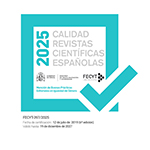Spreading of phonological activation in dyslexia throughout life
Resumen
En este trabajo estudiamos el curso evolutivo de la propagación de la activación fonológica en personas con y sin dislexia mediante una versión de la tarea de falsa memoria de Deese/Roediger-McDermott. Se entiende que el efecto de falsa memoria refleja la propagación de la activación desde los estímulos presentados a las palabras similares en el léxico. Evaluamos a 35 voluntarios con dislexia y a un grupo control emparejados por edad (entre los 6 y los 58 años). Primero se les presentaron seis listas de diez palabras de dos sílabas cada una, todas las cuales compartían una sílaba con una palabra de referencia no presentada. A continuación, respondieron a un cuestionario de reconocimiento que incluía 24 palabras presentadas, 18 palabras no presentadas relacionadas fonológicamente y 12 palabras no presentadas no relacionadas. El reconocimiento falso de palabras relacionadas fonológicamente aumentó con la edad en el grupo de control, pero se mantuvo en niveles muy bajos en el grupo con dislexia. El presente estudio indica la existencia de un déficit en la propagación de la activación fonológica en personas con dislexia a lo largo de la vida.
Descargas
Descarga artículo
Licencia
La Revista de Investigación en Logopedia, para fomentar el intercambio global del conocimiento, facilita el acceso sin restricciones a sus contenidos desde el momento de su publicación en la presente edición electrónica, y por eso es una revista de acceso abierto. Los originales publicados en esta revista son propiedad de la Universidad Complutense de Madrid y es obligatorio citar su procedencia en cualquier reproducción total o parcial. Todos los contenidos se distribuyen bajo una licencia de uso y distribución Creative Commons Reconocimiento 4.0 (CC BY 4.0). Esta circunstancia ha de hacerse constar expresamente de esta forma cuando sea necesario. Puede consultar la versión informativa y el texto legal de la licencia.












